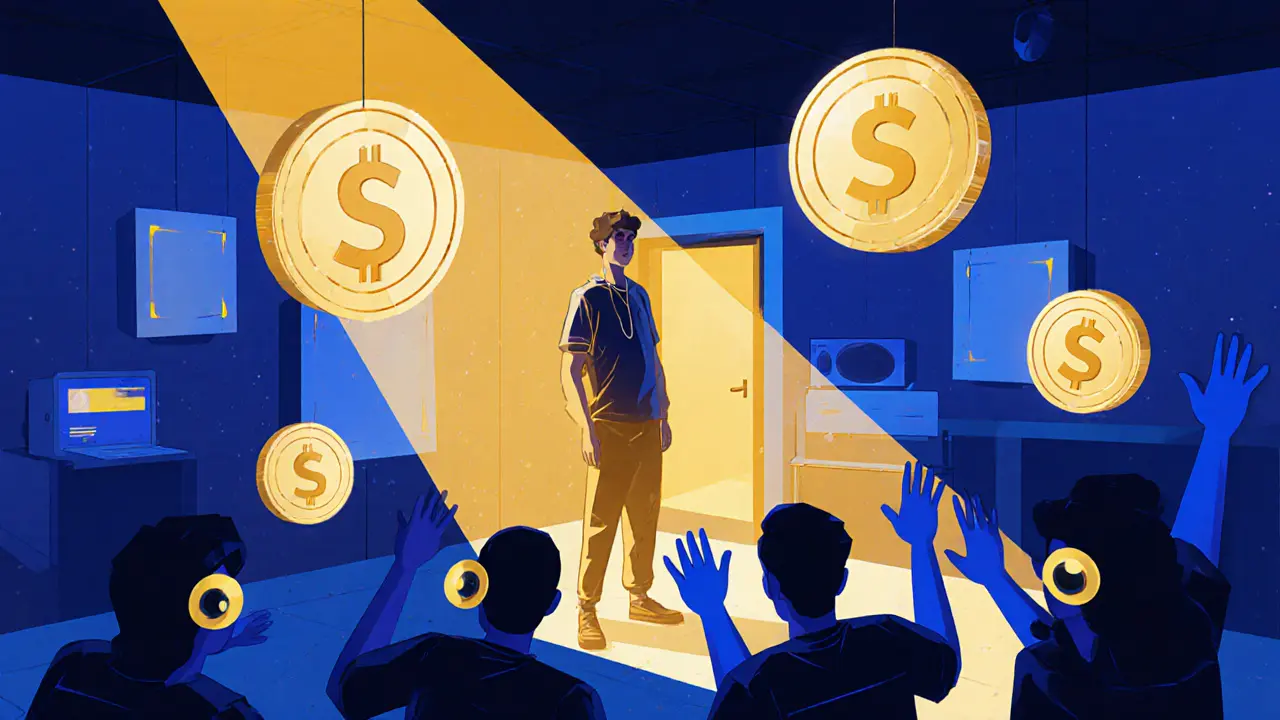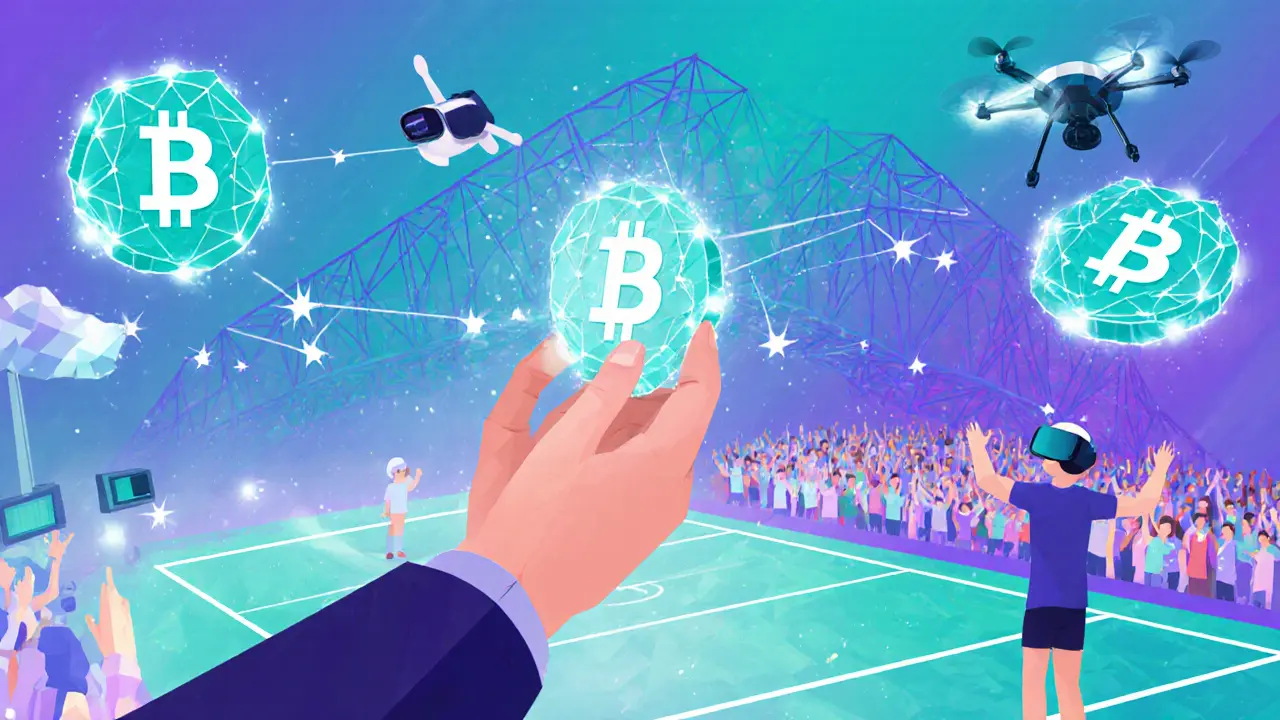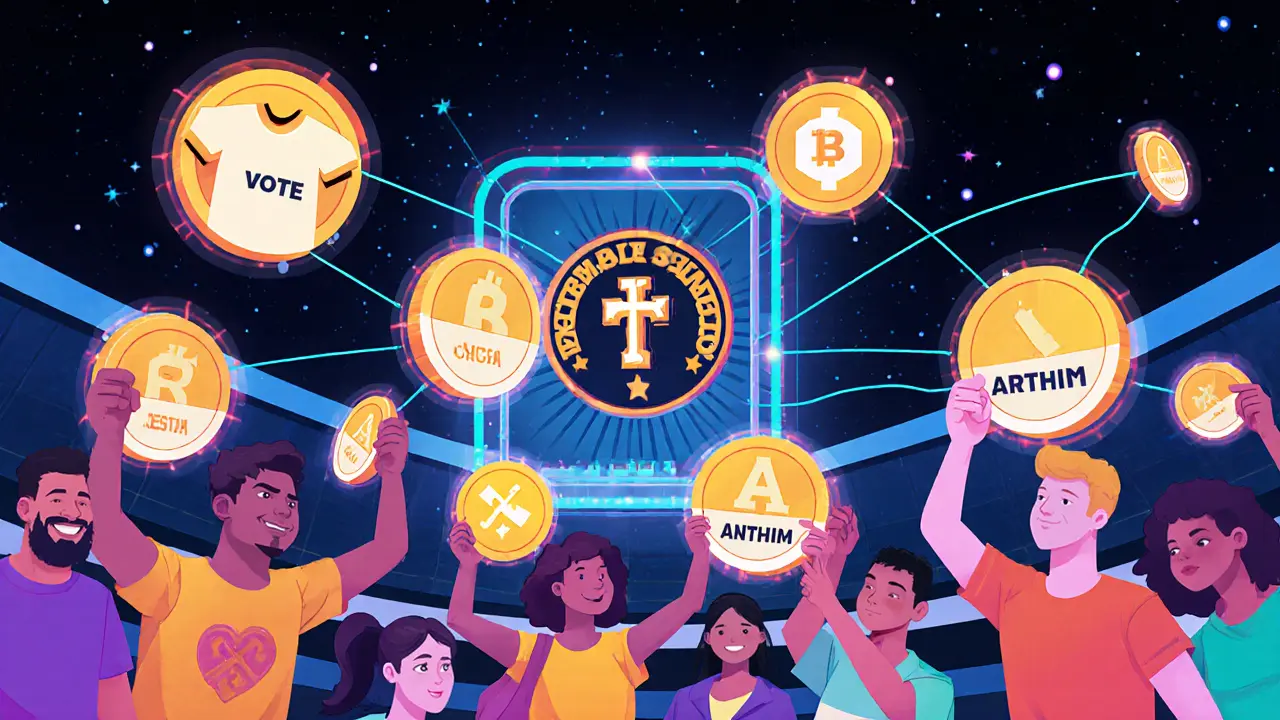Social Token Value Estimator
Estimate Your Token Value
Calculate potential revenue and value for social tokens based on your community and benefits.
Estimated Value
Imagine being able to vote on your favorite team’s new jersey design, get early access to concert tickets before they sell out, or even chat directly with the artist you love-all because you hold a digital token. This isn’t science fiction. It’s happening right now, thanks to social tokens.
What Are Social Tokens and How Do They Work?
Social tokens are digital assets built on blockchain networks that represent membership, loyalty, or influence within a creator’s community. Unlike regular cryptocurrencies like Bitcoin or Ethereum, these tokens aren’t meant to be global money. They’re tied directly to a person, team, or brand-like a music artist, sports club, or YouTube creator. When you buy or earn one, you’re not just spending cash. You’re buying a stake in that community.
These tokens run on blockchains like Ethereum, Polygon, or Solana, which means every transaction is public, permanent, and secure. You can buy them directly from the creator’s website, earn them by attending live events, buying merchandise, or even posting fan content that gets featured. Once you have them, you can hold them, trade them, or use them to unlock perks.
Think of them like a VIP pass-but one that’s digital, tradable, and gives you real say in how things unfold. A fan token from FC Barcelona might let you vote on the team’s charity partner. A token from a pop star could give you a say in the next single’s cover art. The value of the token doesn’t come from a company’s balance sheet. It comes from how much the community cares.
Why Fans Are No Longer Just Watching
Traditional fan loyalty programs used to mean discounts on T-shirts or free posters. Now, fans want to be part of the story. Social tokens turn passive followers into active participants. In 2025, over 60% of web3 communities offer gated content or early access to token holders. That’s not a small trend-it’s a structural shift.
Take the case of Paris Saint-Germain. Their fan token, launched in 2020, lets holders vote on non-critical but emotionally resonant decisions: which song plays when the team walks onto the field, which local charity gets a donation, even the design of a limited-edition jersey. Fans don’t just watch these votes-they argue about them, share them, and feel personally invested in the outcome.
It’s the same with musicians. Singer Grimes sold NFTs tied to her music that gave buyers voting rights on album artwork and remixes. One fan even got to name a track. That’s not marketing. That’s co-creation. And it’s working. Communities that use social tokens report 3x higher engagement than those relying on standard social media posts.
The Real Benefits: More Than Just Voting
Token ownership unlocks more than polls. It opens doors.
- Exclusive content: Behind-the-scenes videos, unreleased tracks, early album previews, private livestreams. These aren’t just bonuses-they’re the main attraction for superfans.
- Priority access: Get tickets before the general public. No bots. No scalpers. Just you and your fellow token holders.
- Merch discounts: 20-40% off official gear. Some teams even let you vote on what new products get made.
- Real-world experiences: Meet-and-greets, studio tours, private Q&As with athletes or artists. Some clubs even offer virtual locker room walkthroughs.
- Badges and status: Your wallet shows your level of involvement. Higher token holdings unlock rare digital collectibles or special titles in Discord servers.
It’s gamified loyalty, but with real skin in the game. You’re not just collecting points-you’re building a reputation. And that reputation has value.

How Creators Are Making Money Without Middlemen
Before social tokens, creators relied on platforms like Spotify, YouTube, or Instagram to reach fans-and those platforms took a huge cut. Now, artists and teams can sell tokens directly to their audience, keeping nearly all the revenue.
When a fan buys a $50 social token, that money goes straight to the creator. No record label. No ticketing company. No ad network. Plus, every time that token is resold on a secondary market, the creator can earn a royalty-often 5-10%-on every trade. That means if the token’s value goes up because the artist’s popularity grows, the creator keeps earning long after the initial sale.
This model turns fans into investors. If you believe in a creator’s future, you buy their token. If they succeed, your token becomes more valuable. It’s a feedback loop: more engagement → higher token value → more investment → stronger community.
Where It’s Working: Sports, Music, Fashion, and Beyond
Sports teams were the first to jump in. Clubs like FC Barcelona, AC Milan, and the Philadelphia 76ers have all launched fan tokens. The 76ers’ token holders voted on the team’s halftime entertainment lineup-and one fan’s idea for a drone light show was chosen. It aired during a game, and the fan got a shoutout on the big screen.
Music artists are next. Grimes, 3Lau, and Snoop Dogg have all released tokens tied to music, art, and experiences. 3Lau gave token holders early access to his album and let them vote on the track order. The album sold out in 12 hours.
Fashion brands aren’t far behind. Balenciaga and Gucci have experimented with NFTs that unlock access to private fashion shows or limited-edition drops. Even indie YouTubers with 50,000 followers are launching their own tokens to fund new projects and reward loyal viewers.
The pattern is clear: wherever there’s a passionate fanbase, social tokens are becoming the new standard for connection.

The Challenges: Not All Fans Are Ready
It’s not all smooth sailing. Many fans still don’t understand how to set up a crypto wallet. Some are scared of volatility-if the token’s price drops, do they feel like they’ve lost money? Others worry about scams or unclear rules.
Regulation is also catching up. In some countries, selling tokens that offer voting rights or profit-sharing could be seen as selling securities. That means creators need legal guidance before launching.
And then there’s the tech barrier. If your grandma wants to vote on the team’s new logo, she shouldn’t need to learn what a private key is. That’s why platforms like Socios.com and Rally.io are building simple apps that hide the complexity behind friendly interfaces. Still, education is key. The best token programs pair access with tutorials, live support, and onboarding guides.
What’s Next for Fan Engagement?
The next phase isn’t just about voting or discounts. It’s about shared ownership.
Imagine a fan-owned podcast studio where token holders fund new episodes and vote on guests. Or a sports team that lets fans collectively decide on player transfers through a decentralized vote. Some teams are already testing this with advisory ballots.
Integration with AR and VR is coming too. Holders might use their tokens to unlock a virtual stadium tour where they can walk beside their favorite player-or attend a concert in a digital world only accessible to token owners.
As blockchain tech gets easier to use, these tools will move from niche experiments to mainstream expectations. By 2027, having a fan token might be as normal as having a loyalty card at your local coffee shop.
Is This for You?
If you’re a creator, athlete, or brand with a loyal following, social tokens offer a direct line to your audience-and a new way to earn. You don’t need millions of followers. You just need people who care enough to invest.
If you’re a fan, ask yourself: Do you want to just watch, or do you want to be part of the story? If the answer is the latter, start small. Buy one token. Join the Discord. Vote on the next poll. See how it feels to have a voice.
This isn’t just about money. It’s about belonging. And for the first time, fans aren’t just along for the ride-they’re helping steer the car.
What’s the difference between a social token and a cryptocurrency like Bitcoin?
Bitcoin is a global digital currency meant for transactions and store of value. Social tokens are tied to a specific person, team, or brand. They’re not used to buy groceries-they’re used to unlock experiences, vote on decisions, and show loyalty within a community. Their value comes from engagement, not market speculation alone.
Can I make money from fan tokens?
You can, but it’s risky. Some tokens increase in value as the creator grows more popular, and you can sell them for a profit. But if the creator loses momentum, the token’s value can drop. Treat it like investing in a fan community-not a stock. The real reward is access and influence, not just financial gain.
Do I need a crypto wallet to use social tokens?
Yes. You’ll need a digital wallet like MetaMask, Phantom, or a platform-specific app (like Socios). But many services now offer simplified onboarding-like signing up with your email and letting them manage the wallet behind the scenes. You don’t need to be a tech expert to start.
Are fan tokens legal?
It depends on your country and what rights the token offers. If a token only gives access to content or voting on fun decisions (like jersey design), it’s usually fine. But if it promises profit-sharing or financial returns, regulators may classify it as a security. Always check local laws and look for projects that are transparent about compliance.
Which platforms offer social tokens?
Popular platforms include Socios.com (for sports teams), Rally.io (for creators), and Zora (for artists and collectibles). Some teams and artists also issue tokens directly through their own websites using blockchain tools like Ethereum or Polygon. Always go through official channels to avoid scams.

Nabil ben Salah Nasri
November 4, 2025 AT 01:24Okay but have y’all seen the PSG jersey vote?? 😍 I voted for the neon green stripes and it actually WON!! Now I feel like part of the team 🏆💙💚
alvin Bachtiar
November 4, 2025 AT 18:37Let’s be real-this ‘fan ownership’ is just crypto-washing. You’re not an investor, you’re a sucker paying $50 for a JPEG that lets you pick the anthem. Meanwhile, the club nets $20M in upfront sales and still controls every decision. Wake up.
Josh Serum
November 5, 2025 AT 19:47Bro, if you don’t have a wallet yet, you’re literally not even in the game. I’ve got MetaMask, Phantom, and a Ledger tucked in my sock drawer. You can’t just ‘try it out’-you gotta commit. Also, did you know Grimes’ tokens are backed by AI-generated art? That’s not fandom, that’s algorithmic capitalism. 😅
DeeDee Kallam
November 7, 2025 AT 17:14i just wanna watch the game without havin to learn what a private key is 😭
Helen Hardman
November 9, 2025 AT 16:41Guys, I just bought my first fan token from a local indie band I’ve followed for 8 years-and they sent me a handwritten thank-you note AND let me pick the color of the vinyl! I cried. This isn’t about money, it’s about connection. I’ve never felt this seen as a fan before. If you’re skeptical, just try one $10 token. You don’t need to go all in. Just feel it. 🌟
Bhavna Suri
November 10, 2025 AT 18:37This is too complicated. Why not just give discounts? Why make it a blockchain thing? I don’t understand.
Elizabeth Melendez
November 11, 2025 AT 18:31OMG YES!! I got my first token from my favorite YouTuber last month and now I’m in her private discord and she did a live Q&A just for token holders!! I felt so special!! Also, she gave us early access to her new song and it’s fire!! If you’re on the fence, just do it!! You won’t regret it!! 💕
Ron Cassel
November 12, 2025 AT 12:12They’re tracking your wallet. They’re using your votes to sell your data to advertisers. Next thing you know, your token status will affect your credit score. The government already knows. The AI is watching. Don’t be the guy who helped them build the fan surveillance state.
Jeremy Jaramillo
November 13, 2025 AT 23:02I’ve been in fan communities for 20 years. This is the first time I’ve felt like my voice actually matters. No more begging for merch drops. No more begging for live streams. I helped pick the setlist for a band I love. That’s not tech-that’s human connection, rebuilt. If you’re scared of crypto, fine. But don’t knock what’s working for real people.
Sammy Krigs
November 14, 2025 AT 05:46i got my token but i think i lost my passwrd 😅 can someone help? i just wanna vote on the new hoodie design
Derek Hardman
November 14, 2025 AT 16:20The underlying premise-that community engagement can be tokenized-is both innovative and economically significant. However, the current implementation lacks standardization and regulatory clarity, which may impede scalability and consumer protection. A more structured governance framework is required.
Eliane Karp Toledo
November 16, 2025 AT 08:28Wait-so if I buy a token, I’m basically funding a cult? And then they use my votes to make me feel important while quietly selling my data to the highest bidder? And the ‘exclusive content’ is just a poorly lit Zoom call? This isn’t revolution. It’s emotional manipulation dressed up in blockchain.
Phyllis Nordquist
November 18, 2025 AT 00:25While the concept of tokenized fan engagement presents a compelling model for decentralized community building, it is imperative that creators implement transparent governance structures, clear utility definitions, and accessible onboarding protocols to ensure equitable participation. The technology is neutral; the ethics are not.
Eric Redman
November 18, 2025 AT 12:06So now I have to pay to feel like I matter? What’s next? Pay to breathe? This is just another way to monetize fandom. I’m out.
Jason Coe
November 20, 2025 AT 04:32Let me tell you something-I bought a token from this indie band I love and they actually let us vote on the album cover. I submitted my design, it got 1200 votes, and it won. Now my art’s on the vinyl. I didn’t make money. But I made something that matters. And that’s way more than any discount ever could. It’s not about the price. It’s about the pride.
Brett Benton
November 22, 2025 AT 03:45Just got my first token from a local soccer team in Portland. We voted on the new mascot-turned out to be a raccoon named ‘Captain Chaos.’ Now I’ve got a digital badge on my Discord and a physical patch on my jacket. This is the future. And it’s weird. And I love it.
David Roberts
November 22, 2025 AT 06:17Tokenization introduces a novel paradigm of stakeholder alignment, yet the latent risk of speculative arbitrage undermines the very social capital it purports to enhance. The ontological shift from passive consumption to participatory governance is non-trivial-but the infrastructure remains brittle, and the incentive structures are misaligned with long-term community sustainability.
Monty Tran
November 23, 2025 AT 02:46They're not letting fans vote on transfers. They're letting fans vote on which color the jersey should be. That's not power. That's distraction.